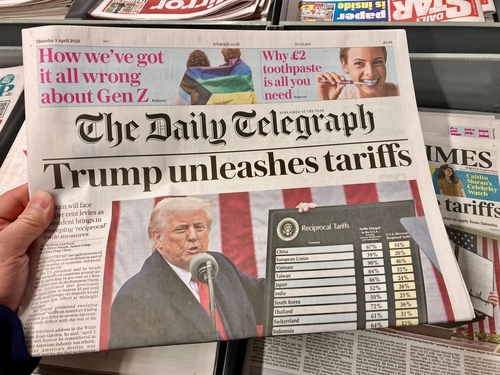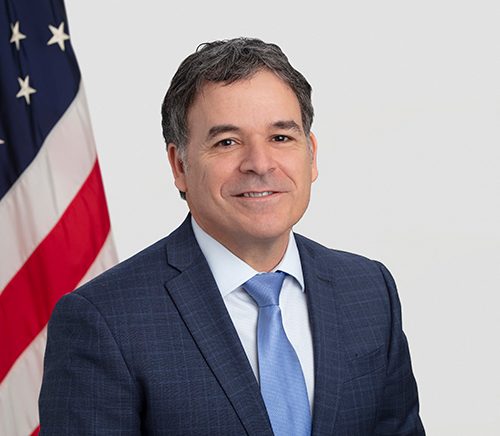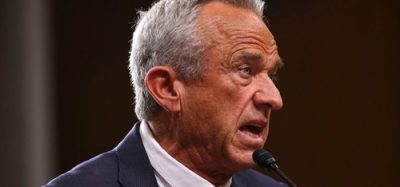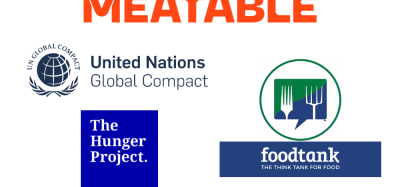The impact of Trump’s tariffs and recent FDA cuts on food safety and security: experts react
- Like
- Digg
- Del
- Tumblr
- VKontakte
- Buffer
- Love This
- Odnoklassniki
- Meneame
- Blogger
- Amazon
- Yahoo Mail
- Gmail
- AOL
- Newsvine
- HackerNews
- Evernote
- MySpace
- Mail.ru
- Viadeo
- Line
- Comments
- Yummly
- SMS
- Viber
- Telegram
- Subscribe
- Skype
- Facebook Messenger
- Kakao
- LiveJournal
- Yammer
- Edgar
- Fintel
- Mix
- Instapaper
- Copy Link
Posted: 4 April 2025 | Ian Westcott | No comments yet
Leading food safety experts, including Frank Yiannas, Bill Marler, Dr Darin Detwiler, Professor Chris Elliott, Tim Lang and Michael Bell OBE, weigh in on the far-reaching consequences of President Trump’s tariffs and recent FDA budget cuts. The article delves into the risks to food safety, supply chains and global food security, highlighting concerns over rising foodborne illness threats and potential disruptions to food quality and availability.


President Donald Trump announces historic tariffs, including a 10% baseline levy on all trading partners, as part of his economic strategy. Photo credit: Shutterstock
On 02 April 2025, President Donald Trump announced sweeping tariffs that he described as “historic,” imposing a baseline 10 percent tariff on all trading partners and additional targeted levies on nations he claims have disadvantaged the US in trade. Declaring it “Liberation Day,” Trump stated that these measures would reclaim America’s economic destiny.
While the administration frames these Trump Tariffs as a step towards economic revival, experts warn of serious consequences for food safety and security. Compounding the issue, recent FDA cuts are already straining regulatory oversight, raising concerns about the quality and safety of imported and domestic food products.
Food industry leaders and policy experts on both sides of the Atlantic are voicing alarm over the combined impact of these developments. From disruptions in supply chains to reduced FDA inspections, the ripple effects could increase foodborne illness risks, drive up costs and weaken consumer trust in the food system.
These insights were provided directly to New Food by industry leaders who share their concerns over the far-reaching consequences of these developments.
The FDA cuts: a lack of surgical approach


Frank Yiannas cautions that FDA budget cuts could weaken food safety oversight, risking slower responses to emerging threats. Credit: Smarter FY Solutions
Frank Yiannas, former Deputy Commissioner for Food Policy and Response at the FDA, has expressed concern over the recent budget cuts and their potential consequences for food safety.
“My heart and thoughts go out to the dedicated men and women at the FDA who lost their jobs, and I want to thank them for their service to the American people.”
“In some areas, the cuts appear to be deep and not as surgical or pinpointed as I would have liked them to be. These cuts have the potential to result in a lack of sufficient subject matter input into business and communication processes” Yiannas states.
His concerns are rooted in the risk that the consolidation of resources could slow down critical food safety processes, making it harder for the FDA to respond to emerging threats.
Yiannas emphasises that for these cuts to lead to better public outcomes, they must be coupled with transformational changes in food safety, such as the implementation of the FDA’s New Era of Smarter Food Safety Blueprint. This blueprint advocates for the use of emerging technologies, smarter regulations and better data analytics to modernise food safety. “If, and only if— the cutbacks are coupled with Smarter Food Safety approaches, they could not only save the American taxpayer money but also improve public health and food safety outcomes,” Yiannas asserts.
If the cutbacks are coupled with Smarter Food Safety approaches, they could not only save the American taxpayer money but also improve public health and food safety outcomes.” — Frank Yiannas
The US perspective: legal and policy concerns
Bill Marler, a leading food safety attorney at Marler Clark, echoes these concerns, warning that the combined effects of FDA budget cuts and increased tariffs creates a concerning landscape for food safety.
“The reduction in regulatory oversight and funding can lead to increased risks of foodborne illnesses, while tariffs can disrupt supply chains and lead to increased prices and potential compromises in food quality.”
Marler further explains how budget cuts can reduce staffing levels at the FDA, limiting the agency’s ability to inspect food facilities and oversee food safety protocols. “Fewer inspectors could result in oversights and increased risks of contamination,” he warns. At the same time, the pressure from tariffs might force companies to seek alternative sources or substitutions that do not meet the same safety and quality standards, heightening the risk of unsafe food entering the supply chain.


Dr Darin Detwiler warns that tariffs may lead companies to prioritise cost over safety, increasing the risk of foodborne illnesses. Credit: Detwiler Consulting Group LLC
Dr Darin Detwiler, internationally recognised food policy and technology expert, with 25+ years’ experience in shaping federal food policy, supports this view, adding that tariffs could lead to unintended risks as US companies might seek out alternative suppliers with a weaker safety infrastructure.
“Tariffs can indirectly create situations where companies prioritise price over safety, making US consumers more vulnerable to foodborne illnesses,” Detwiler cautions. The additional financial burden of tariffs could also push companies to source from less regulated regions, potentially compromising the quality of imported goods. This could mirror past instances, such as the 2008 Chinese melamine milk scandal, where cost pressures led to dangerous shortcuts in food safety.
Both Marler and Detwiler’s work as food safety advocates is highlighted in the Emmy Award-winning Netflix documentary Poisoned: The Dirty Truth About Your Food, which examines systemic failures in food safety.
Rising food prices and insecurity
Alongside food safety concerns, Detwiler highlights the potential for increased food insecurity as a result of the tariffs. The US imports a significant portion of its fresh produce, much of it from Mexico and Latin America. Should tariffs make these imports too costly, low-income communities will face reduced access to nutritious food. “Food security means having consistent access to affordable, nutritious food. If tariffs raise the cost of imported fresh vegetables and fruits, families may have to reduce their consumption, leading to poorer diets and nutritional deficiencies,” Detwiler explains.
“Tariffs can indirectly create situations where companies prioritise price over safety, making US consumers more vulnerable to foodborne illnesses.” — Dr. Darin Detwiler
This economic strain also raises the risk of food fraud, where cost-cutting measures in the supply chain could lead to adulterated or counterfeit food products entering the market. As Detwiler warns, “Tariffs create exactly that kind of stress by raising prices and disrupting usual trade flows,” potentially leading to the rise of fraudulent food products like mislabelled seafood or diluted olive oil.
A European perspective: food security and trade with the US
While the tariffs are causing concern in the US, their effects are being felt across the Atlantic as well. Professor Chris Elliott, Founder of the Institute for Global Food Security at Queen’s University Belfast, cautions that the UK will likely face significant risk to our food supply chains.
“Back in the dark days after Brexit when Boris Johnson & co were scurrying to Donald Trump to get an ‘oven ready’ trade deal with the US there were fears that part of the trade offs would be the UK accepting the import of a wide range of foods from the US that did not meet UK food standards. Due to many complex factors no trade deal was agreed and the food fears receded. But now they are back and back on steroids. The tariffs impact on the UK economy will be large and negative and the drive to get a trade deal in place with the US is probably the top agenda item for the UK government. As Trump has highlighted agriculture as one of his key areas to get a ‘level playing field’ food imports of hormone treated beef and chlorinated chicken will be coming our way sooner or later.”
A wake-up call for food policy in a new era of uncertainty
Tim Lang, Professor of Food Policy at City University London, also raises concerns about the broader impact of tariffs on food systems.
‘The Trump tariffs are yet another wake-up call to the UK public, not just the food industries, that we are entering a new era. It’s characterised by uncertainties, naked power (not just corporate power), and by higher prices. The public is poorly prepared. The situation isn’t helped by politicians not being particularly trusted to sort out matters. To be fair, this is a cultural as well as an economic challenge to recent food normality. It requires government to be firm, to think more out of the box, and to be straight with consumers. Decades of food globalisation is being shredded. We need more attention to bio regionalism, to rebuilding diverse supply chains and to treating food as a key critical national infrastructure. The public must engage with the new realities.”
Northern Ireland’s food industry: resilience amid uncertainty
Michael Bell OBE, Executive Director of the Northern Ireland Food and Drink Association (NIFDA), emphasises that while Northern Ireland’s food and drink sector has built a strong reputation for quality and sustainability, the uncertainty surrounding tariffs poses a significant challenge.
“There will be twists and turns as the turbulence generated by the unique set of decisions that President Trump has made continues. Food and drink companies in Northern Ireland, particularly those exporting to the EU, will be paying particular attention to how Europe reacts. We still don’t know how the dominoes are going to fall or how exactly this could affect global supply chains. But we do know that uncertainty is bad for business.”
Despite this, Bell remains confident in the resilience of Northern Ireland’s food industry, which has cultivated loyal customers based on quality, provenance, and high standards. However, he warns that tariffs will inevitably lead to food inflation, placing additional pressure on consumers already struggling with rising costs.
“Ultimately, tariffs are taxes, and that means food inflation. The industry will do what it can, but the scale of the challenge could make it difficult to absorb increased, unnecessary costs due to supply chain disruption and taxation.”
A cross-Atlantic call for action
The Trump administration’s tariffs and the FDA’s budget cuts are reshaping the global food landscape in ways that will have lasting effects on food safety, food security and the broader economy. From the US to the UK and beyond, food industry experts are urging both governments and consumers to prepare for the challenges ahead in this volatile new landscape. As these changes continue to unfold, one thing is clear: the world of food and beverage is entering a new era marked by rising costs, shifting trade policies and heightened food safety risks.
Related topics
Food Fraud, Food Safety, Food Security, Outbreaks & product recalls, retail, Revenues, Supply chain, Sustainability, Traceability, Trade & Economy, World Food
Related organisations
Food and Drug Administration (FDA), Marler Clark, Northern Ireland Food and Drink Association (NIFDA), Queen's University Belfast
Related regions
Africa, Asia Pacific & Oceania, Central and South America, Central and South Asia, Europe, Middle East, North America, UK & Ireland
Related people
Bill Marler, Chris Elliott, Darin Detwiler, Frank Yiannas, Michael Bell, Tim Lang









